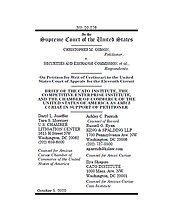Learn more about Cato’s Amicus Briefs Program.
How many constitutional infractions must one endure at the government’s hands before getting the chance to be heard in an Article III court? According to the Securities and Exchange Commission (SEC), the answer is at least two.
In April 2017, an in-house judge at the SEC made an initial determination that Christopher Gibson had violated securities regulations. But before the SEC could finalize its order against Mr. Gibson, the Supreme Court ruled in Lucia v. SEC that the agency’s in-house judges are “inferior officers” subject to the Appointments Clause. Because SEC judges had not been appointed by the “President alone…Courts of Law, or…Heads of Departments”—as required by Article II—the Supreme Court invalidated all ongoing administrative enforcement proceedings before the SEC, including the one against Mr. Gibson. That was his first unconstitutional proceeding.
After Lucia, the SEC attempted to cure this constitutional defect by “ratifying” its administrative law judges’ prior appointments. The problem is that by addressing its Appointments Clause violation, the SEC violated constitutional requirements regarding the removal of officers. In Free Enterprise Fund v. PCOB, the Supreme Court held that “officers” of the United States may not be insulated from presidential control by more than one layer of tenure protection. Yet the SEC’s judges enjoy employment protections, and they are removable by SEC commissioners, who also enjoy employment protections. That is, the SEC’s administrative law judges are “officers” with at least two layers of tenure protections and, therefore, run afoul of the Supreme Court’s reading of the president’s removal authority, as set forth in Free Enterprise Fund.
Enough is enough. Earlier this year, with the help of the New Civil Liberties Alliance, Mr. Gibson filed suit against the SEC in a federal district court in Georgia, arguing that he should not have to undergo a second unconstitutional enforcement proceeding. After the district court dismissed his case, Mr. Gibson appealed to the Eleventh circuit, which upheld the lower court. Now, he seeks Supreme Court review.
Building on our prior participation in related cases, the Cato Institute, joined by the Competitive Enterprise Institute and the U.S. Chamber of Commerce, today filed a brief in support of Mr. Gibson’s petition. We urge the Court to open the doors of the federal judiciary to Mr. Gibson and similarly situated parties, who otherwise lack recourse for the constitutional injuries they’ve suffered.

This work is licensed under a Creative Commons Attribution-NonCommercial-ShareAlike 4.0 International License.
